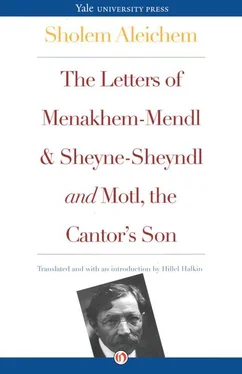“The boys should be your biggest problem,” Moyshe said.
That was Moyshe’s way of telling us that we hadn’t outstayed our welcome and had plenty of time to think about a dzhahb.
Don’t imagine we lived like spongers. My mother helped Pesye in the kitshn with the cooking, baking, washing, and cleaning. Taybl made the beds and swept the rumz. Pinye worked with Moyshe at his book stend.
Moyshe couldn’t depend too much on Pinye, though. That’s because as soon as Pinye sees a book, he’s into it nose first and bye-bye Pinye. That’s not the worst of it. The worst is that he’s a scribbler himself. He’s gotten hold of a funtinpen that never runs out of ink and paper is cheaper in America than borscht. He sits at Moyshe’s stend and scribbles away.
“Are you studying penmanship?” Elye asks.
Pinye doesn’t answer. He takes what he writes and sticks it deep into the breast pockets of his jacket. His pockets are so full that he looks like a stuffed animal.
Until we find dzhahbz, Mendl and I help the gang as best we can. I work with Log (I mean Sem) carrying cartons while Mendl is partly with Tomcat (that’s Villi) in the grawsri staw and partly with Filip (that’s Petelulu) selling the Jewish peypehz. For our pay we get tickets to the moofink pikshehz on Sundays and an eiskrim senvitsh and a sawdeh. Then we take a vawk in the pahk. There are lots of pahks in New York, all free. What a country! I go where I want and do what I like.
For a while I hung out at the stend of my old friend Bumpy — I mean Herry — in my free time. But Bumpy’s bawss didn’t like seeing me there. She knew he sometimes ate a carob pod or a couple of raisins and almonds on the sly. The two of us, she said, were more than her stend could afford.
So I don’t go there any more. But Bumpy always has something for me in his pocket when he comes home at night. Once Brokheh caught me chewing and ratted to Elye. Elye asked what I had in my mouth. “Tshooinkahm,” I said. Brokheh said tshooinkahm chewers made her nauseous. “They remind me of cows,” agreed Elye. Pinye objected to the comparison. He said:
“How can you take the greatest, the smartest, the freest people on earth and compare them to cows? Just tell me this: where would we be now if Columbus hadn’t discovered America?”
“In an America discovered by someone else,” Elye answered. He said it just like that, without even having to think about it.
Hallelujah, we have dzhahbz! No more twiddling our thumbs. Our freeloading days are over. We’re working in a shahp. I don’t mean me and Mendl. We’re too young. I mean Elye and Pinye. What’s a shahp and what do you do in one? That’s the next thing I’m going to tell you.
Don’t ask me exactly what working in a shahp is like because I don’t rightly know. I’m not allowed in one because I’m under thirteen. I only know what I hear at night from Elye and Pinye. Do they have stories!
They come home bushed and hungry and we sit down to sahpeh. That’s a word Brokheh hates like a Jew hates pork. Another word she can’t stand is vindeh. Ask her to open a vindeh and she’ll say, “Vindeh is what comes before spring.” She has it in for stahkinks too. It doesn’t sound like anything she would want to wear on her feet. And dishehz is no better. Why can’t we say posude the way we used to? Or take lef l —you would think it was a good enough word. But no, we have to call it a spuhn! “Still, I suppose,” Brokheh says (she always has some new saying), “that if America is a kahntri, and steyk is a food, and a gopl is a fawk, English must be a language.”
Elye and Pinye work in different shahps. Elye is an ahpereydeh. Pinye is a presseh. An ahpereydeh sews on a machine. That’s something you have to learn. The machine doesn’t run by itself.
How did Elye get to be an ahpereydeh when our family never had a tailor or a machinist all the way back to our great-great-grandfathers? We’ve always been rabbis, cantors, beadles — that’s what my mother says. Who would have thought we’d fall so low? But this is America. In America there’s nothing you can’t do. You can be anything.
Take a rabbi, for example. A rabbi is supposed to have studied for years. But in America there are rabbis called revrindz who were ordinary butchers back in Russia. Elye met a revrind who does circumcisions. In the old country he was a woman’s tailor.
“You must be joking,” Elye said. “This is America,” answered the revrind.
So how did my brother learn to run a machine? The same way the ladies’ tailor learned to do circumcisions. It took him a while to get the hang of it. First they gave him some leftover fabric to practice with. The next morning they told him to start sewing. You probably think he made a mess of it. Actually, he did pretty well. He did a lot better than Pinye.
That’s not because Pinye is lazy. Nothing is further from the truth. Pinye is ready for any drudge work that will help him make a living in America. His problem is being nearsighted and in a rush. They sat him down next to Elye and gave him some leftovers too — and right away he has an eksehdent and sews his left sleeve to the machine! He’s lucky he didn’t sew his hand to it. Did everyone split their sides! All the ahpereydehz were hooting and hollering. Grinhawn, they called Pinye. A grinhawn is someone just off the boat who doesn’t know which end is up. It’s a bad name to be called, a lot worse than a thief. And that wasn’t all. Listen to this.
In Elye’s shahp where Pinye tried learning to sew, there happens to be an old friend of ours: Pinye’s bugaboo, the tailor from Heysen. It was just Pinye’s luck to meet up with him again — and what a meeting! The tailor from Heysen is a big shot in that shahp. He’s not an ahpereydeh, he’s a kahdeh. That means he cuts the fabric that the ahpereydehz sew. And he thinks he’s too good even for that. He doesn’t plan to hang around long because he has his sights set on being a dizeineh. A dizeineh is big time. He can make fifty, seventy-five, a hundred dahlehz a week! When you strike it rich, you strike it rich. As Brokheh puts it: “God gives everyone a lot. He gives some a lot of money and some a lot of trouble.”
Pinye ran into the tailor from Heysen his first day in the shahp. The tailor took off his snazzy glasses, stuck out a hand, and said: “Hallaw, homeboy! Hah duh yuh doo?” Pinye is so blind that he didn’t recognize the joker until he mentioned the Prince Albert. Then, says Pinye, he felt three holes in his heart. You might ask what the tailor from Heysen ever did to Pinye. But Pinye can’t stand the looks of him. He wouldn’t work with him in one shop if he were paid a thousand dahlehz an hour. That’s what made him sew his sleeve to the machine. He was that flustered.
In short, Pinye’s not cut out to be an ahpereydeh. He’s found a dzhahb in another shahp as a presseh. Right now he’s an assistant presseh. Once he learns the ropes, he’ll be up for promotion. He can rise pretty high, he says.
How high is that?
“It’s anyone’s guess,” Pinye says. “The sky is the limit. Not even Kahnegi, Vendehbilt, or Rahknfelleh knew how far they would go.”
Meanwhile Pinye is having a hard time. His problem is always being in a hurry. He doesn’t see too well, either. Every night he comes home dragging his tail.
One night he came with a burned nose. What happened? He burned it on his own iron. How do an iron and a nose get together? Pinye blames the nose. He was bending over to look for some fabric when it ran into the iron.
“A shlimazel! If he fell into a snow bank, he’d crack his skull on a rock.”
I don’t suppose I have to tell you that’s from Brokheh. She has a big mouth, Brokheh does.
Читать дальше












